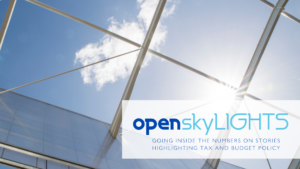
2.6%
Since the start of 2020, Nebraska brought in more tax revenue than it would have collected under its pre-pandemic growth rate, but the state’s growth in revenues trailed the national average.
Nebraska posted 2.6% more in inflation-adjusted tax revenue between Jan. 1, 2020, and March 31, 2023, but with the growth rate nationally at 3.6%, there’s evidence that Nebraska is far from being a high tax state.
Nationally, inflation-adjusted tax collections appear to have peaked in 2022 and are now on a downward trend amid inflationary pressures, slowing economic growth and reductions in federal pandemic aid. And as revenue growth has slowed, Nebraska and 30 other states implemented income tax rate cuts this year. In Nebraska, once rate reductions in LB 754 are fully implemented, they will reduce available state revenues by $905 million in FY2029.
Read more from the Pew Charitable Trusts
130
More than 130 tax experts, including Adam Thimmesch, Margaret R. Larson Professor of Law at the University of Nebraska, recently signed a letter to public officials applauding the IRS for moving toward a simple, free-filing system for all taxpayers.
In a recent survey by Hart Research, 56% of voters nationwide said they were less likely to support a candidate who opposes free filing. The letter from professors highlights the benefits of the pilot Direct File program for all taxpayers and specifically low-income workers who annually spend 7% of their refunds on tax preparation costs. The average taxpayer spends more than 10 hours preparing their return each year.
Read more from the Coalition for Free and Fair Filing
6.5%
Nebraska’s new tax on casino revenues generated $12.9 million in the first nine months of 2023, with 70% – about $9 million – directed to the state’s Property Tax Credit Cash Fund. In addition, cities and counties where a casino is located split 25% of casino tax revenues. In Lincoln, where the first casino opened in September of last year, the city and Lancaster County each brought in about $100,000 in tax revenue each month.
Local governments, however, are reserving some of that revenue to offset expected losses in tax revenue from keno games now that casinos are coming on line. In Lincoln, where keno revenues traditionally support parks and libraries, money spent on keno declined 6.5% over the first half of 2022. Temporary casinos now operating in Lincoln, Grand Island and Columbus will be replaced by larger gaming floors in each city over the next few years. A casino is also in development in Omaha.
Read more from the Lincoln Journal Star
-1.6%
The fastest pace of Federal Reserve interest-rate hikes in decades contributed to declines in housing sales, used vehicle prices, retail sales and private investment but did little to the labor market as unemployment and layoff rates have remained unchanged.
Researchers with the Federal Reserve Bank of Kansas City point to the post-pandemic labor shortage, which has prompted employers to raise wages to hold on to workers and hire new workers who may not be fully qualified even amid predictions of slower sales. The combination, experts say, contributes to the 1.6% drop in labor productivity reported in July as workers likely to be laid off or not hired in the first place remain employed.
Little change is expected until increased supply or reduced demand eases the labor shortage. OpenSky’s Fall Policy Symposium on Oct. 24 will feature a panel discussion on the demographic and economic trends driving workforce challenges in Nebraska and solutions that can enable new Americans to participate more fully in growing the state’s economy.
